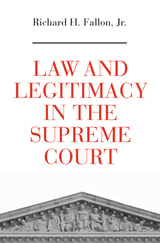
This book argues that the Supreme Court performs two functions. The first is to identify the Constitution's idealized "meaning." The second is to develop tests and doctrines to realize that meaning in practice. Bridging the gap between the two--implementing the Constitution--requires moral vision, but also practical wisdom and common sense, ingenuity, and occasionally a willingness to make compromises.
In emphasizing the Court's responsibility to make practical judgments, Implementing the Constitution takes issue with the two positions that have dominated recent debates about the Court's proper role. Constitutional "originalists" maintain that the Court's essential function is to identify the "original understanding" of constitutional language and then apply it deductively to current problems. This position is both unwise and unworkable, the book argues. It also critiques well-known accounts according to which the Court is concerned almost exclusively with matters of moral and constitutional principle.
Implementing the Constitution bridges the worlds of constitutional theory, political theory, and constitutional practice. It illuminates the Supreme Court's decision of actual cases and its development of well-known doctrines. It is a doctrinal study that yields jurisprudential insights and a contribution to constitutional theory that is closely tied to actual judicial practice.

Winner of the Thomas M. Cooley Book Prize, Georgetown Center on the Constitution
Why do self-proclaimed constitutional “originalists” so regularly reach decisions with a politically conservative valence? Do “living constitutionalists” claim a license to reach whatever results they prefer, without regard to the Constitution’s language and history? In confronting these questions, Richard H. Fallon reframes and ultimately transcends familiar debates about constitutional law, constitutional theory, and judicial legitimacy.
Drawing from ideas in legal scholarship, philosophy, and political science, Fallon presents a theory of judicial legitimacy based on an ideal of good faith in constitutional argumentation. Good faith demands that the Justices base their decisions only on legal arguments that they genuinely believe to be valid and are prepared to apply to similar future cases. Originalists are correct about this much. But good faith does not forbid the Justices to refine and adjust their interpretive theories in response to the novel challenges that new cases present. Fallon argues that theories of constitutional interpretation should be works in progress, not rigid formulas laid down in advance of the unforeseeable challenges that life and experience generate.
Law and Legitimacy in the Supreme Court offers theories of constitutional law and judicial legitimacy that accept many tenets of legal realism but reject its corrosive cynicism. Fallon’s account both illuminates current practice and prescribes urgently needed responses to a legitimacy crisis in which the Supreme Court is increasingly enmeshed.
READERS
Browse our collection.
PUBLISHERS
See BiblioVault's publisher services.
STUDENT SERVICES
Files for college accessibility offices.
UChicago Accessibility Resources
home | accessibility | search | about | contact us
BiblioVault ® 2001 - 2024
The University of Chicago Press









